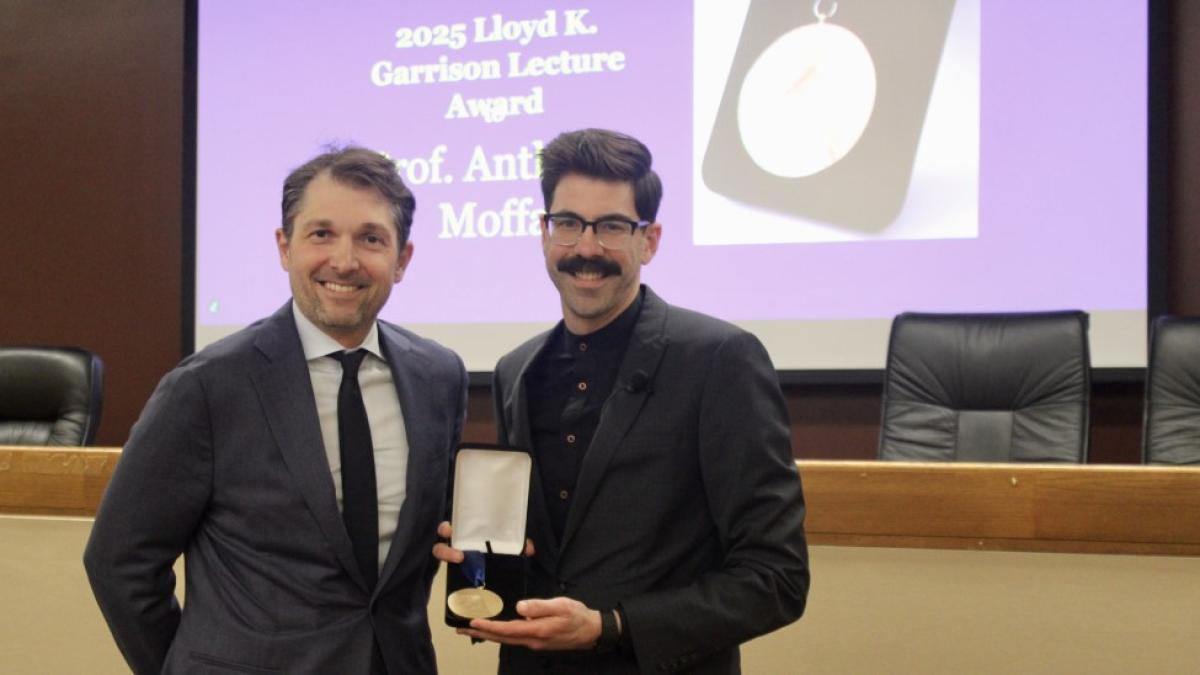Professor Anthony Moffa delivered the Annual Lloyd K. Garrison Lecture on Environmental Law on Thursday, April 3 on "Back to the Future for Climate Liability." The Lloyd K. Garrison Lecture on Environmental Law was established in memory of Lloyd K. Garrison in 1995. Professor Anthony Moffa currently serves as a Haub Visiting Scholar at the Elisabeth Haub School of Law at Pace University. He is also a Professor and Associate Dean for Innovation at University of Maine School of Law, where he oversees the Environmental and Oceans Law Certificate Program.
Pace University Receives NYS Economic State Development Grants for Nursing, Life Sciences
Funds through the NYS Regional Economic Development Councils will help renovate labs, update curricula, and create a pipeline of workers in healthcare and medtech.
Pace University has been awarded two grants from New York State to upgrade science laboratory space and purchase equipment to help address a critical need for more clinical lab technicians and nurses in the region.
The funds – totaling $145,000 – will help revitalize and upgrade existing science labs in Dyson Hall of Science on the Pleasantville campus ($100,000), and purchase equipment to expand the health care simulation lab on its New York City campus ($45,000).
The awards were first announced by Gov. Kathy Hochul and part of the New York Regional Economic Development Council Initiative, a competitive grant process that supported 97 priority projects throughout New York State with $81 million.
"The pandemic toll touched every corner of the state and every sector of New York's economy, and as a result we must ensure that our recovery does the same," Governor Hochul said. "As we move forward from the pandemic we are using the rolling grant process to build New York State back better by supporting shovel-ready projects with the potential to accelerate new investments and catalyze economic growth in every community."
“Pace has a long tradition of educating skilled and in-demand medical professionals like nurses, nurse practitioners, and clinical lab technicians,” said Marvin Krislov, president of Pace University. “The pandemic has been an all-too-important reminder of how important this pipeline is to the health and wellbeing of our communities. These new funds will enable the strategic capital investments that will prepare our students for productive careers in health care and the life sciences. We are grateful to New York State for this support.”
Earlier this year, Pace gained the support of the Hudson Valley and New York City Regional Economic Development Councils, which made recommendations to Gov. Hochul’s administration. As a result, Pace earned two of only eight grants awarded to colleges and universities throughout New York City and the Hudson Valley, and is investing in its campus and curriculum to train more nurses and lab technicians.
In particular, Pace is renovating nearly 1,800 square feet of existing lab space in Dyson Hall, updating curricula, strengthening internships, and adding state-of-the-art media equipment that supports multiple teaching and learning styles. The state funds complement dollars set aside for capital investments; the total cost of lab renovations is expected to be $900,000 and be completed in 2022.
The grant announcement comes at an integral time for Pace University. Earlier this year, Pace outlined its plans to transform Lienhard Hall, home to its College of Health Professions on the Pleasantville campus, into a Healthcare Hub with the help of $1 million in state funding that will add important programming for students preparing for careers in the region’s burgeoning healthcare and biotechnology sector. The university also received a $2 million grant from the federal government to increase opportunities and retention for historically underrepresented minorities in the field of nursing, which in recent years has been estimated that as many as 75,000 qualified students were turned away from undergraduate and graduate programs in the U.S. because of insufficient space, clinical sites, and faculty, according to an American Association of Colleges of Nursing’s report.
Provost Vanya Quiñones noted that these REDC grants will help increase Pace’s capacity to train more workers in these particular fields, and that the university is committed to increasing representation of underrepresented minorities, women, and veterans, which is consistent with its mission of “Opportunitas,” or creating opportunities for people.
“Partnering with the state on these projects is not only a win for Pace and its students by enabling us to provide experiential learning in nursing and life sciences, but it benefits communities as it will create a much-needed career pipeline into clinical laboratory science and health care professions,” Quiñones said. “This is a key investment that will pay dividends over time.”
About Pace University
Pace University has a proud history of preparing its diverse student body for a lifetime of professional success as a result of its unique program that combines rigorous academics and real-world experiences. Pace is ranked the #1 private, four-year college in the nation for upward economic mobility by Harvard University’s Opportunity Insights, evidence of the transformative education the University provides. From its beginnings as an accounting school in 1906, Pace has grown to three campuses, enrolling 13,000 students in bachelor’s, master’s, and doctoral programs in more than 150 majors and programs, across a range of disciplines: arts, sciences, business, health care, technology, law, education, and more. The university also has one of the most competitive performing arts programs in the country. Pace has a signature, newly renovated campus in New York City, located in the heart of vibrant Lower Manhattan, next to Wall Street and City Hall, and two campuses in Westchester County, New York: a 200-acre picturesque Pleasantville Campus and the Elisabeth Haub School of Law in White Plains. Follow us on Twitter or on the Pace News website.
About Dyson College of Arts and Sciences
Pace University’s liberal arts college, Dyson College, offers more than 50 programs, spanning the arts and humanities, natural sciences, social sciences, and pre-professional programs (including pre-medicine, pre-veterinary, and pre-law), as well as many courses that fulfill core curriculum requirements. The College offers access to numerous opportunities for internships, cooperative education and other hands-on learning experiences that complement in-class learning in preparing graduates for career and graduate/professional education choices.
About the College of Health Professions
Established in 2010, the College of Health Professions at Pace University offers a broad range of programs at the bachelor, master, and doctoral levels. It is the College’s goal to create innovative and complex programs that reflect the changing landscape of the health care system. These programs are designed to prepare graduates for impactful careers in health care practice, health-related research, or as educators, and equip graduates to work in health policy and global health fields. Students in clinical programs receive hands-on training in the College’s interprofessional Center for Excellence in Healthcare Simulation and have the opportunity to apply their developing skills in real-world settings at many of the regions' leading clinical facilities. The College is currently comprised of several growing and important areas of study, which include the Lienhard School of Nursing with Nursing programs from undergraduate through doctorate, Physician Assistant, Communication Sciences and Disorders, Nutrition and Dietetics, Occupational Therapy, and Health Science. Our vision is to be recognized for our innovative leadership in education, practice, scholarship, and service to improve health and the health professions. Our mission is to educate and challenge diverse students for the health professions to be leaders, innovators and lifelong learners who will positively impact local, national, and global health. For more information, please visit the College of Health Professions website.


